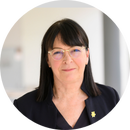How we help
Driving research discovery in childhood cancer
Professor Joanne Aitken, General Manager of Research, Cancer Council QLD, leads the Australian Childhood Cancer Registry, a critical Australian research tool driving major cancer research discoveries both here and overseas.
Whilst the past few decades have seen some amazing improvements in treatment and survival for many childhood cancers, it is still the number one cause of disease-related death in Australian children aged 1-14 years. Cancer Council is committed to saving the lives of all children with cancer, and key to this is the provision of support for world class research like that being undertaken by the Australian Childhood Cancer Registry.
Professor Joanne AitkenWhilst the past few decades have seen some amazing improvements in treatment and survival for many childhood cancers, it is still the number one cause of disease-related death in Australian children aged 1-14 years. Cancer Council is committed to saving the lives of all children with cancer, and key to this is the provision of support for world class research like that being undertaken by the Australian Childhood Cancer Registry."
Head of Research, Cancer Council Queensland
The Australian Childhood Cancer Registry (ACCR) was established in 1977 by Cancer Council in partnership with passionate clinicians who were frustrated by the lack of information available about the diseases affecting their patients.
Today, the Australian Childhood Cancer Registry (ACCR) is one of the longest running projects of its kind in the world. Led by Cancer Council researcher Professor Joanne Aitken, the ACCR has had a huge impact on how we view and manage childhood cancer, impacting both here and overseas.
Professor Joanne AitkenI got into this research field because of the potential to improve the lives of children and families experiencing cancer. There was such an obvious gap in knowledge and I felt I could contribute my skills towards improving that."
Head of Research, Cancer Council Queensland
How is it that a library of data can make such a big difference to the lives of so many? Cancer in children is rare and difficult to study, and it is only by pooling information from all children diagnosed across Australia that we can begin to fill in the gaps in our understanding to enable the best possible research into childhood cancer. This long-running project is helping us to see where and when childhood cancer occurs, how different children respond to different treatments, and where survival is improving or lagging behind. It is building the global evidence base and driving national and international research into the causes, prevention and cure for this rare but devastating cancer.
Professor Joanne AitkenOverall survival has improved greatly over time due to the continuing advances from cancer clinical trials. We’ve seen around 40% reduction in mortality of childhood cancer overall with five-year survival rates of lymphoid leukaemia (the most common childhood cancer) now approaching 90%."
Head of Research, Cancer Council Queensland
The Australian childhood cancer project has also delivered a platform for increasing awareness of childhood cancer amongst policy makers and the community. It is providing accurate information on the impact of childhood cancer, not available from any other source, and is helping the government and organisations like Cancer Council to dedicate clinical resources and support to the right place at the right time.
Finally, and importantly, the ACCR provides much needed information and hope for families dealing with a childhood cancer diagnosis. Based on the ACCR’s results, parents can be assured that children with cancer in Australia receive some of the best cancer care in the world.
As technology advances, so does the capability of the ACCR. The continued investment by Cancer Council into this vital research tool promises to play a significant role in overcoming childhood cancer.
Professor Joanne AitkenThe pace of research is entirely determined by the amount of funding that Cancer Council receives. Australian researchers have the talent, the ideas and the technology, and with the continued support of Cancer Council donors we will reach a cancer free future."
Head of Research, Cancer Council Queensland
Looking Ahead
We won’t rest until we’ve dramatically reduced the significant impact cancer has on every member of our community.

